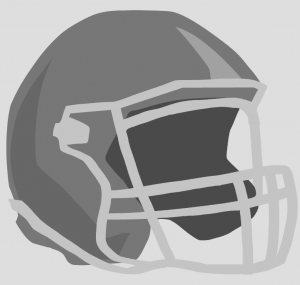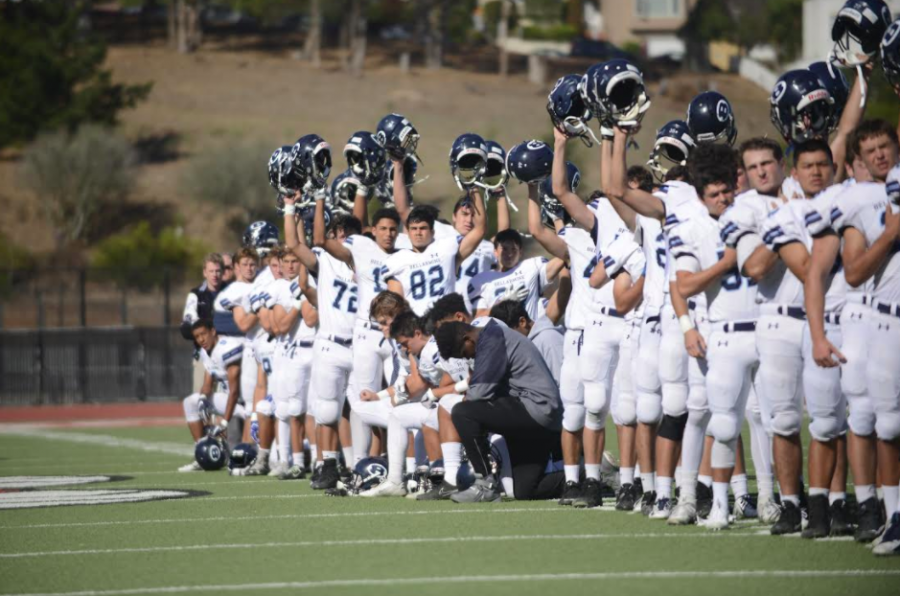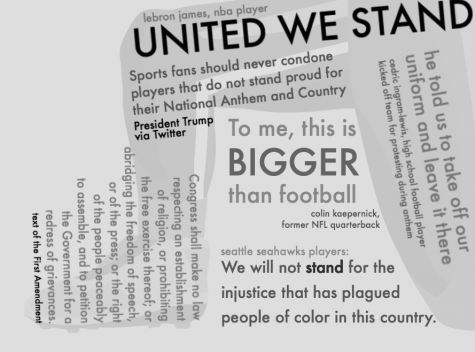Taking a knee: Athletes and activists across nation kneel to take a stand
The varsity football team’s homecoming game against Rio Vista on Sept. 23 highlighted high school football for many upper school football fans. Every football player on both sides stood during the performance of the national anthem before the game, as is customary. In the professional world, however, NFL players have begun to protest during the national anthem.
Members of the Bellarmine football team knelt this past weekend at this game as well as at the game the week before.
October 12, 2017

 Former NFL quarterback Colin Kaepernick dropped his contract with the San Francisco 49ers after last season, when he began to kneel during performances of the national anthem before games in order to protest the mistreatment of people of color in the U.S. This season, Kaepernick remains unsigned.
Former NFL quarterback Colin Kaepernick dropped his contract with the San Francisco 49ers after last season, when he began to kneel during performances of the national anthem before games in order to protest the mistreatment of people of color in the U.S. This season, Kaepernick remains unsigned.
Kaepernick began to play for the 49ers in the 2012 season, and he helped the team reach the National Football Conference championship game in the 2013 season, his first full season as a starting quarterback.
Perhaps because he was such a prominent player, protests like Kaepernick’s have gained national attention, sparking debates about the place of politics in sport and even remarks from the president supporting a boycott of the NFL until players stop protesting the anthem.
At a rally for Senate candidate Luther Strange of Alabama on Sept. 22, President Donald Trump said that NFL players protesting the national anthem should be fired.
“Wouldn’t you love to see one of these NFL owners, when somebody disrespects our flag, to say, ‘get that son of a b—- off the field right now, out, he’s fired’?” Trump said at the rally, to cheers and chants of “USA”. “That’s a total disrespect of our heritage. That’s a total disrespect of everything that we stand for.”
Trump tweeted on Sept. 24 advocating for a boycott of the NFL until the NFL suspends or fires players that protest the national anthem or those players stop.
Several NFL players and team owners, as well as players from other sports including basketball and baseball, condemned Trump’s criticism of the league in statements or in demonstrations, while other prominent owners were silent.
“If NFL fans refuse to go to games until players stop disrespecting our Flag & Country, you will see change take place fast. Fire or suspend!” reads one of the series of Sept. 24 tweets. Another: “Sports fans should never condone players that do not stand proud for their National Anthem or their Country. NFL should change policy!”
Three teams notably did not appear on the field for the anthem at all. The Pittsburgh Steelers at Chicago’s Soldier Field and the Seattle Seahawks and Tennessee Titans at Nashville’s Nissan Stadium stayed in the locker room and members of the Oakland Raiders knelt during performances of the anthem at their games on Sept. 24.
Members of the Jacksonville Jaguars and Baltimore Ravens along with Jaguars owner Shahid Khan and Ravens owner John Harbaugh locked arms prior to their game that day, in London’s Wembley Stadium. Some members of the teams knelt for the American anthem, and then stood for the British one.
“As a team, we have decided we will not participate in the national anthem,” a statement issued by Seahawks players reads. “We will not stand for the injustice that has plagued people of color in this country. Out of love for our country and in honor of the sacrifices made on our behalf, we unite to oppose those that would deny our most basic freedoms. We remain committed in continuing to work towards equality and justice for all.”
Some football fans have connected Kaepernick’s current status as a free agent to his protests last season and are boycotting the NFL for a different reason than Trump — they side with Kaepernick.
The boycott was started by activist Shaun King, who published a Medium article on Sept. 8 describing a total avoidance of NFL games and highlights due to the league’s supposed blacklisting of Kaepernick.
The boycott’s Twitter account, @TheNFLBoycott, had more than 32,000 followers and its Facebook page had more than 18,000 likes at press time.
“Don’t let up. Not for a single game,” reads a Sept. 16 tweet from @TheNFLBoycott. “Don’t watch the games. Don’t go to the games. Don’t buy the merch. Don’t even watch the highlights.”
Other athletes, including Oakland Raiders running back Marshawn Lynch, followed Kaepernick’s actions even before Trump’s statements, with Lynch sitting during anthem performances this season.
“I think the reason [Kaepernick] is not on an NFL roster and not on a team right now is because he started the trend of kneeling during a game,” varsity football team captain and quarterback Nate Kelly (12) said. “With Marshawn Lynch and a bunch of other players that are doing it, they’re still on a team, I think because [Kaepernick] started that.”
The boycott aims to impact NFL’s TV ratings heavily enough that the league or team owners will notice.
“I’m still going to watch games,” Nate said. “I think a lot of people feel that way too. They’re just going to watch it and don’t think [the boycott] has an effect on how the ratings go.”
However, dips in ratings so far this season have been attributed more to the likes of Hurricanes Harvey and Irma, which caused millions in the southeastern U.S. to lose power. Skepticism exists towards the boycott because some fans believe the NFL will shy away from the overt politicality of changing their attitudes toward the protest.
“I think the NFL is just stuck in their own ways,” varsity football team defensive lineman Jalen Clark (12) said. “The NFL are not really going to listen to what people have to say, what players and fans are going to say. The GMs [general managers] of teams are not really going to listen to new people and try and change their ways.”
Many fans also believe that the number of people mustered by the boycott effort will not be enough to cause a significant drop in ratings.
“In order for [a boycott] to be effective, I think it has to be massive in scale, and the NFL I don’t think is worried at all,” U.S. history teacher Julie Wheeler said. “To do a large-scale boycott, you absolutely need everyone to buy in or even a significant number to stop supporting, stop watching, stop so that the advertisers will then walk away, and I don’t think any advertisers are necessarily walking away at this point.”
Other fans look to differing reasons to boycott the NFL, such as controversies over its treatment of players accused of domestic violence or other crimes, as well as discoveries that repeated head trauma like that caused by playing football can lead to chronic traumatic encephalopathy, a neurodegenerative disease.
“Between the treatment of Kaepernick, between the way the NFL has been phenomenally inconsistent regarding other behaviors by their players, in particular regarding domestic violence, and then with a lot of the research coming out about traumatic brain injury, I’m finding myself really struggling to pay really attention to football,” diversity committee member and world history teacher Mark Janda said. “I haven’t watched a game this year, and I’m a person who could watch 10 football games in a weekend.”
Kaepernick’s protests last season garnered both support and backlash, with fans objecting to his actions as disagreeable or too political or praising them as brave and correct.
“I think Kaepernick deserves another chance,” varsity football team running back Aaron Smith (11) said. “I think he’s just using the platform he’s on to voice his own opinion, and people shouldn’t hate him for him having his own opinion.”
Some fans attribute Kaepernick’s current lack of a team to both the protests and his perceived worse performance in recent seasons: after the 2013 season, the 49ers never qualified for the NFL playoffs. (A total of six teams each from the league’s two conferences compete in the annual playoffs, and a team’s qualification depends on its record in the regular season.)
“When [Kaepernick] started these protests, he wasn’t a key player for the 49ers. He peaked a few years ago,” football fan Akhila Ramgiri (11) said. “If he was a slightly better player, people would be able to overlook that, but since his career was on a downhill slope, he was unfairly not given any opportunity with another team.”
Jalen attributes Kaepernick’s inability to be signed to NFL team owners leery of controversy from fans.
“He did know he was famous and a lot of people pay attention to what he’s doing. He had a reason behind his actions, so that’s why I really support what he was doing,” Jalen said. “I feel like everybody knows that he’s a great athlete. Everyone’s scared politics-wise because they feel like he’ll be a threat to the organization. The fans will either go away from the team or they’ll start creating chaos.”
Another human rights-related protest during an athletic event came during the 1968 Summer Olympics in Mexico City, one of the most prominent instances of protest in the Olympics.
African-American runners Tommie Smith and John Carlos, who had won the gold and bronze medals in the 200-meter race, raised black-gloved fists on the podium for the duration of the national anthem during their medal ceremony.
“Sports and athletics have always been used for political purposes. If you look at the Olympics and their history, the games are a source of nationalism and pride,” Wheeler said. “If you go back to 1968 with the Olympics, that was the runners from San Jose State [University] who stood on the medal podium with the black leather glove and made the black power [sign.] That, I think, is the most relevant comparison to Kaepernick.”
Prominent professional athletes using their platform to send a social message is not novel, but the prevalence of social media today allows instances of protest by athletes, and discussion of it like the creation of the boycott, to flourish.
“[Kaepernick’s] action during the national anthem last year echoes similar actions for the last 50 years by African-American athletes, and so in that regard, it’s not new,” Janda said. “The context might be different than Vietnam or the civil rights movement, but it’s part of a larger historical trend.”

Ultimately, the entertainment value of the NFL leaves it appealing to other football fans who, while they might be indifferent to Kaepernick’s protesting, are not following the boycott and are still watching games this season.
“[Kaepernick] is a good quarterback, and he deserves a chance, but the NFL is fun. It’s entertainment,” football fan Matthew Lee (12) said. “Marshawn Lynch is also protesting, so by supporting the Raiders I’m supporting him.”
As athletics and protest will remain a point of contention this season, many passionate fans will continue to watch NFL games.
“I haven’t really looked deep into the boycott, but I should, probably,” varsity football team captain and defensive back Angel Cervantes (12) said. “I love the game of football. I think it’s beautiful, especially when there’s really good players — so I’m still going to watch the games.”
This piece was originally published in the pages of The Winged Post on October 12, 2017.


















![“[Building nerf blasters] became this outlet of creativity for me that hasn't been matched by anything else. The process [of] making a build complete to your desire is such a painstakingly difficult process, but I've had to learn from [the skills needed from] soldering to proper painting. There's so many different options for everything, if you think about it, it exists. The best part is [that] if it doesn't exist, you can build it yourself," Ishaan Parate said.](https://harkeraquila.com/wp-content/uploads/2022/08/DSC_8149-900x604.jpg)




![“When I came into high school, I was ready to be a follower. But DECA was a game changer for me. It helped me overcome my fear of public speaking, and it's played such a major role in who I've become today. To be able to successfully lead a chapter of 150 students, an officer team and be one of the upperclassmen I once really admired is something I'm [really] proud of,” Anvitha Tummala ('21) said.](https://harkeraquila.com/wp-content/uploads/2021/07/Screen-Shot-2021-07-25-at-9.50.05-AM-900x594.png)







![“I think getting up in the morning and having a sense of purpose [is exciting]. I think without a certain amount of drive, life is kind of obsolete and mundane, and I think having that every single day is what makes each day unique and kind of makes life exciting,” Neymika Jain (12) said.](https://harkeraquila.com/wp-content/uploads/2017/06/Screen-Shot-2017-06-03-at-4.54.16-PM.png)








![“My slogan is ‘slow feet, don’t eat, and I’m hungry.’ You need to run fast to get where you are–you aren't going to get those championships if you aren't fast,” Angel Cervantes (12) said. “I want to do well in school on my tests and in track and win championships for my team. I live by that, [and] I can do that anywhere: in the classroom or on the field.”](https://harkeraquila.com/wp-content/uploads/2018/06/DSC5146-900x601.jpg)
![“[Volleyball has] taught me how to fall correctly, and another thing it taught is that you don’t have to be the best at something to be good at it. If you just hit the ball in a smart way, then it still scores points and you’re good at it. You could be a background player and still make a much bigger impact on the team than you would think,” Anya Gert (’20) said.](https://harkeraquila.com/wp-content/uploads/2020/06/AnnaGert_JinTuan_HoHPhotoEdited-600x900.jpeg)

![“I'm not nearly there yet, but [my confidence has] definitely been getting better since I was pretty shy and timid coming into Harker my freshman year. I know that there's a lot of people that are really confident in what they do, and I really admire them. Everyone's so driven and that has really pushed me to kind of try to find my own place in high school and be more confident,” Alyssa Huang (’20) said.](https://harkeraquila.com/wp-content/uploads/2020/06/AlyssaHuang_EmilyChen_HoHPhoto-900x749.jpeg)







